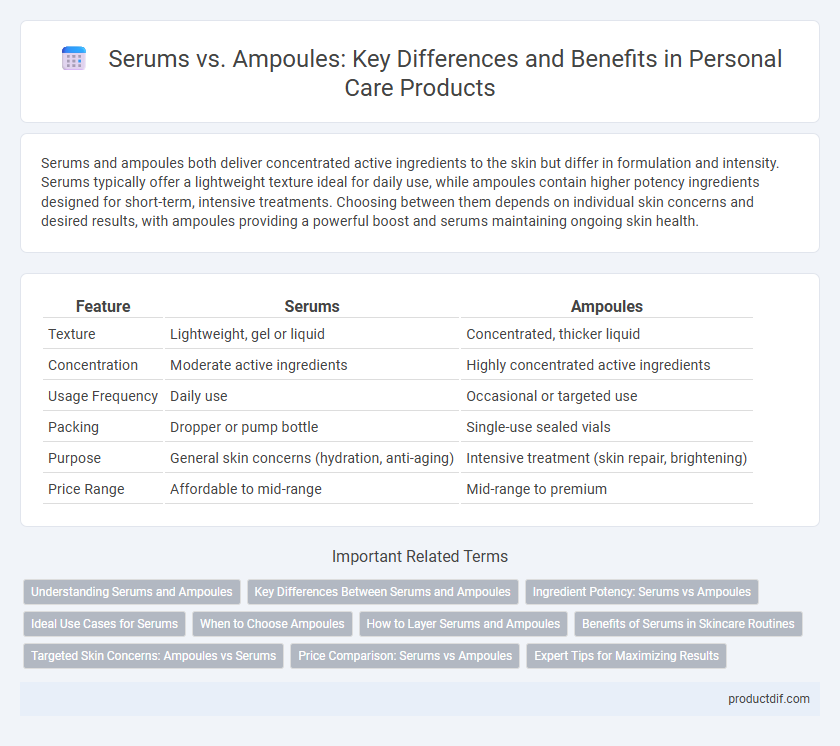Serums and ampoules both deliver concentrated active ingredients to the skin but differ in formulation and intensity. Serums typically offer a lightweight texture ideal for daily use, while ampoules contain higher potency ingredients designed for short-term, intensive treatments. Choosing between them depends on individual skin concerns and desired results, with ampoules providing a powerful boost and serums maintaining ongoing skin health.
Table of Comparison
| Feature | Serums | Ampoules |
|---|---|---|
| Texture | Lightweight, gel or liquid | Concentrated, thicker liquid |
| Concentration | Moderate active ingredients | Highly concentrated active ingredients |
| Usage Frequency | Daily use | Occasional or targeted use |
| Packing | Dropper or pump bottle | Single-use sealed vials |
| Purpose | General skin concerns (hydration, anti-aging) | Intensive treatment (skin repair, brightening) |
| Price Range | Affordable to mid-range | Mid-range to premium |
Understanding Serums and Ampoules
Serums and ampoules are concentrated skincare formulas designed to target specific skin concerns with potent active ingredients. Serums typically offer a lightweight texture ideal for daily use and long-term benefits, while ampoules contain higher concentrations of actives for short-term, intensive treatment. Understanding the distinction between these two products ensures effective incorporation into skincare routines based on individual skin needs and goals.
Key Differences Between Serums and Ampoules
Serums typically contain a lower concentration of active ingredients and are designed for daily use to address overall skin concerns like hydration and anti-aging. Ampoules have a higher potency with concentrated formulas targeting specific issues such as brightening or skin repair and are usually used as a short-term boost. Both products enhance skincare efficacy but differ in intensity, application frequency, and targeted results.
Ingredient Potency: Serums vs Ampoules
Ampoules contain higher concentrations of active ingredients compared to serums, making them ideal for targeted, intensive skin treatments. Serums deliver effective doses of nutrients with a lighter formula suitable for daily use and broader skin concerns. The potency of ampoules supports rapid skin improvement, while serums provide gradual, consistent benefits through regular application.
Ideal Use Cases for Serums
Serums are ideal for daily skincare routines targeting specific concerns such as hydration, anti-aging, and brightening due to their lightweight, fast-absorbing formulas rich in active ingredients like hyaluronic acid and vitamin C. They work effectively under moisturizers, making them perfect for layering with other products to enhance overall skin texture and tone. Especially suitable for long-term maintenance and gradual improvements, serums provide consistent delivery of potent nutrients without causing irritation.
When to Choose Ampoules
Ampoules are ideal for targeted, intensive skincare treatments due to their high concentration of active ingredients, making them suitable for addressing specific concerns like dullness, dehydration, or aging. Use ampoules during periods of skin stress or when your complexion requires a quick boost, such as after exposure to harsh weather or during seasonal transitions. Their potent formula delivers results faster than serums, which are better suited for daily maintenance and ongoing skincare routines.
How to Layer Serums and Ampoules
When layering serums and ampoules, apply thinner, water-based formulas like hydrating serums first to ensure deep penetration, followed by thicker, oil-based ampoules to seal in moisture and active ingredients. Use lightweight vitamin C serums before richer anti-aging ampoules containing peptides or retinol to maximize their efficacy without compromising absorption. Allow each product to fully absorb for one to two minutes before applying the next layer to prevent pilling and enhance skin benefits.
Benefits of Serums in Skincare Routines
Serums deliver concentrated active ingredients such as hyaluronic acid and vitamin C directly into the skin, boosting hydration and promoting collagen production for a youthful appearance. Their lightweight formulas allow for quick absorption and compatibility with various skin types, making them ideal for daily use. Regular application of serums improves skin texture, reduces signs of aging, and enhances overall radiance in skincare routines.
Targeted Skin Concerns: Ampoules vs Serums
Ampoules deliver highly concentrated active ingredients designed for intense, short-term treatment of specific skin concerns such as dullness, acne, or dehydration. Serums typically offer a balanced formulation aimed at long-term maintenance and overall skin health, effectively addressing fine lines, uneven texture, and hyperpigmentation. Choosing between ampoules and serums depends on the immediacy and severity of targeted skin issues, with ampoules suited for rapid, powerful results and serums for sustained, gradual improvement.
Price Comparison: Serums vs Ampoules
Serums generally offer a more cost-effective option per ounce compared to ampoules, which tend to be priced higher due to their concentrated formulations and smaller packaging. Brand reputation and ingredient potency significantly influence the price differences, with premium serums often matching or exceeding ampoule costs. Consumers seeking intensive skincare treatments might find ampoules justify the premium price despite serums typically providing better value for regular use.
Expert Tips for Maximizing Results
Serums deliver concentrated active ingredients like hyaluronic acid and vitamin C for targeted skin benefits, while ampoules offer supercharged formulations designed for intense short-term treatment. Experts recommend applying ampoules first to address acute concerns and layering serums afterward to maintain daily skin health and hydration. Incorporating both strategically based on skin needs can maximize results by combining immediate potency with sustained nourishment.
Serums vs Ampoules Infographic

 productdif.com
productdif.com